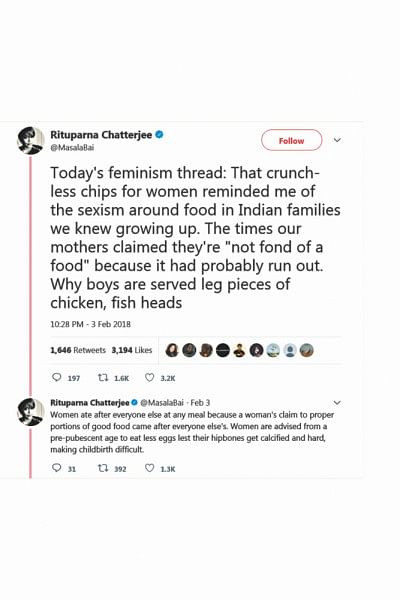Food for thought

A recent Twitter thread on sexism and food by Rituparna Chatterjee, Editor in Chief of HuffPost India, got me thinking about my own experiences with the issue. Chatterjee embarked on a succinct and relatable breakdown on the topic of sexism around food in Indian households—and it echoed the thoughts I had, obviously having grown up in a South Asian household myself. I found myself nodding in amazement as her words paralleled my experiences, which I had never stopped to properly analyse before because "that's just how things are", but which now had a proper sense of legitimacy. I wouldn't call Chatterjee's commentary a rant at all. It was a real, and much-needed critique of a culture that has harboured misogyny as flattery.
Speaking to several family members and friends about this, I am confident that this is a topic many people will be able to relate to. When dishing out food, do our mothers not give up the more favourable pieces of meat or fish, under the pretence of not liking them that much? Men, and boys, always got the first pick. Men were always served first at dinner parties too, leaving us women waiting until it was our turn to eat. Men sat at the table, women had to create makeshift dining areas in other rooms. Men got larger portions, but it would be scandalous for a woman to be seen as overeating. Women must be dainty but men can eat as sloppily as they please. As an aside, there is also a point to be made about basic table manners, so realistically, neither sex should be eating messily, but men tend to get away with doing it. Being boisterous at the dinner table isn't necessarily expected of men, but it is accepted.
There are, of course, other things too that Chatterjee mentions, that will resonate with a lot of you. When a couple hosts a dinner party, usually the woman cooks, serves the food, and cleans, while the man mingles with the guests, effectively becoming one of them. Chatterjee describes this as "hiding the misogyny as flattery", when men delegate this task to the women of the house, because "they're just better at this sort of thing". While the guests are seated around the table, the hostess hovers around, topping up glasses, giving out second and third helpings, often only joining the table either halfway through dinner if she's lucky, or eating after everyone else has. The woman either says she isn't hungry, or she ate earlier, or will eat later, once the guests are taken care of.
Being a good host is one thing, and it certainly doesn't involve a woman compromising her hunger or appetite. Similarly, giving out the biggest and best portions to guests seems like something a good host should do, but it often leads to the woman having the smallest and least satisfying portion of food.
Those that know me know that I love food. I enjoy food the way it was meant to be enjoyed. I'll eat fried chicken with my hands, I'll crunch on bones and cartilage (much to the revulsion of my Western friends), I'll lick my fingers, I'll slurp my daal and happily load my plate with different types of torkari all at once. I believe in proper table manners and dinner etiquette when out in public, but in the sanctity of my own home, around people I am comfortable with, I prefer to savour every last morsel. I am sure the way I eat would shock my ancestors. It would shock the more conservative members of our society. I reiterate Chatterjee's emphatic proclamation about these archaic notions: "to hell with them. Crunch your chips, lick the sauce off your fingers, chomp your food, take delight in what you eat. They made up the rules for you as they went anyway, you can do the same."
As always when a woman voices her opinion online, she is harangued by men decrying feminism, saying that women are more naturally suited to nurture others, that women do it out of love rather than expectations, that men do more labour-intensive work and therefore deserve more food, that there are worse things to be complaining about, that it doesn't happen in all households. The usual arguments repeated ad nauseam. These rebuttals are hollow, and hold no sustenance. Women are taught to be caregivers from an early age, when we are moulded by society's gender roles to become nurturers. Yes, there is an element of care and love involved when serving others food. Naturally you want your loved ones to be well-fed. That doesn't mean that the woman has to go without, which is what Chatterjee's original point was—the fact that in a lot of households, the women compromise their own health so that others can eat first, and eat more. Derailing a conversation about a specific issue with "whataboutisms"—one of my favourite neologisms, referring to those that begin every counterargument with "what about…"—is highly counterproductive.
Chatterjee also never claimed that men never sacrifice. It was a general commentary on the roles men and women play in society, and the societal expectations of both when it comes to food culture in South Asian households. She also emphasised that just because it never happened to some people, doesn't mean it doesn't happen. In response to those saying "but my mother fed us first out of love" she asserts that that is due to choice, something that a lot of women unfortunately do not have. Families that experienced equality in all aspects of their life, including food and dining, are the exceptions that prove the rule. From what I've read online and from what I've heard from other people, equal opportunity families are very much a minority. And in no way is this limited to South Asian countries, as I've found out.
This conversation isn't part of some nefarious feminist agenda to overthrow society (maybe just the patriarchy…) and plunge our country back into the Dark Ages. It's about deconstructing age-old practices within our culture that don't benefit everyone equally. Are the women, who slave over stoves all day and then resort to eating scraps and leftovers, benefitting from this? Are we teaching our sons that they must expect their wives to serve them, and are we teaching our daughters that they must put their husbands before their own needs? To those that are privileged enough to not experience this, are you aware that this level of inequality exists throughout your country, affecting the majority of families?
We can't continue conditioning girls and boys into thinking this behaviour is okay. Ingrain better practices into them. Introduce equality into every aspect of your life. Feminism isn't just about pushing women to be CEOs. Equality starts at home. Equality takes place at the dinner table, over freshly made food, with everyone seated and eating together.
Zahrah Haider is a journalism graduate and freelance writer currently living in the UK.










Comments